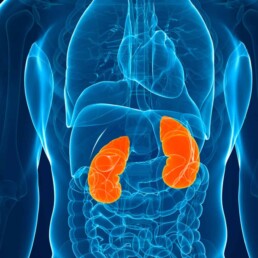As we delve deep into countless medical journals to uncover the latest on Integrative Medicine’s approach to kidney health, we are always reminded of the value of your time. Our commitment remains steadfast in curating and succinctly summarizing these vital studies for you. Welcome to the February Research and News.
Alkali-Rich Diets in CKD: A Shield Against Kidney Injury
A pivotal study by Nimrit Goraya et al., published in Kidney International Reports, investigated the effects of dietary acid reduction in patients with stage G1 chronic kidney disease (CKD) who maintain a normal estimated glomerular filtration rate (eGFR).
This randomized trial involved 153 participants who received interventions aimed at reducing dietary acid through increased consumption of fruits and vegetables or oral sodium bicarbonate, compared to usual care, over five years.
Results demonstrated that these interventions significantly reduced acid accumulation and lowered biomarkers of kidney injury, suggesting that dietary modifications could play a crucial role in protecting kidney function in early-stage CKD patients.
Why is this important?
This research underscores the potential of dietary interventions in managing CKD at an early stage, particularly among patients with a normal eGFR.
By reducing dietary acid load, the study suggests a proactive approach to delay or prevent the progression of kidney damage, offering a non-invasive strategy that could be easily implemented in daily life.
The findings highlight the importance of dietary management in CKD, paving the way for guidelines that could include dietary modifications as a standard recommendation for early-stage CKD patients to maintain kidney health and function.
Elevated Urinary Arsenic and Its Impact on Kidney Health in US Adults
Investigators in this research published in the Journal of Trace Elements in Medicine and Biology, December 2024, looked at the association between urinary arsenic levels and kidney damage among US adults from 2007 to 2018 using data from NHANES.
Employing multivariable logistic regression models, the study reveals that higher quartiles of urinary arsenic significantly correlate with increased risks of kidney damage, particularly albuminuria and hyperuricemia.
The research underscores a concerning link between elevated arsenic levels, primarily due to environmental exposure, and various indicators of kidney damage, suggesting an urgent need for further investigative and preventive measures.
Why is this Important?
This study is critical as it highlights the potential public health implications of arsenic exposure on kidney health, an issue that may be underrecognized in environmental health policies.
Understanding the relationship between arsenic exposure and kidney damage not only helps in early diagnosis and treatment but also underscores the importance of regulating and monitoring environmental contaminants to prevent chronic kidney diseases.
This necessitates more stringent environmental protections and targeted public health initiatives to reduce arsenic exposure in vulnerable populations.
Nicotinamide Riboside and Coenzyme Q10: Boosting Mitochondrial Health in Chronic Kidney Disease
A study by Ahmadi et al., published in the Clinical Journal of the American Society of Nephrology on January 23, 2025, explored the impact of Nicotinamide Riboside (NR) and Coenzyme Q10 (CoQ10) on inflammation, oxidative stress, and mitochondrial function in individuals with chronic kidney disease (CKD).
Conducted as a pilot randomized, double-blind, placebo-controlled crossover trial with 25 participants suffering from moderate-to-severe CKD, the research demonstrates that a 6-week supplementation of 1200 mg/day of CoQ10 and 1000 mg/day of NR significantly improves oxidative stress markers and inflammatory profiles.
The study further elucidates that NR enhances mitochondrial bioenergetics in immune cells, suggesting potential therapeutic benefits in managing CKD-related complications.
Why is this important?
The findings of this study are pivotal as they provide preliminary evidence that targeting mitochondrial dysfunction through specific supplements like NR and CoQ10 can ameliorate some of the biochemical disturbances associated with CKD.
This approach offers a novel avenue for the management of CKD, highlighting the role of mitochondrial health in slowing the progression of kidney damage and improving the overall quality of life for patients.
Such interventions, if validated in larger clinical trials, could become part of the standard nutriceutical regimen for CKD, offering a non-invasive and potentially cost-effective treatment strategy.
Join us to end the kidney disease epidemic
Gut Microbiota’s Role in IgA Nephropathy: Linking Diet, Immunity, and Kidney Health
In a study published in the Journal of Trace Elements in Medicine and Biology, researchers investigated the connection between gut microbiota and the production of galactose-deficient IgA1 (GdIgA1), a key factor in IgA nephropathy (IgAN).
The research, using 16S ribosomal RNA gene sequencing, identifies significant differences in the fecal microbiota of IgAN patients compared to healthy controls, notably an increased abundance of Escherichia-Shigella.
This bacterium correlates with elevated levels of GdIgA1 and specific immune responses. Additionally, the study observed a decrease in IgA protease-producing commensal bacteria in IgAN patients, which might contribute to the disease by altering immune regulation in the gut.
Why is this important?
Understanding the role of gut microbiota in the development of IgA nephropathy enhances our knowledge of the disease’s pathogenesis and could lead to novel therapeutic strategies.
By elucidating the connection between diet, microbiota, and systemic immune responses, this research paves the way for targeted interventions that could modify the gut flora to reduce GdIgA1 production and potentially slow the progression of kidney disease.
This emphasizes the importance of a holistic approach in treating this kidney disease, considering a comprehensive gut restoration protocol to target its root cause.
Review article of the month
Interplay between periodontitis and chronic kidney disease
Periodontitis, a common chronic inflammatory condition affecting the tooth-supporting tissues, not only leads to tooth loss but also has significant systemic effects, including increasing the risk of chronic kidney disease (CKD).
This relationship between periodontitis and CKD, and other non-communicable diseases (NCDs) like diabetes and cardiovascular disease, appears to be bidirectional and independent of shared risk factors, suggesting that periodontitis acts as a non-traditional risk factor for these conditions.
The pathophysiology of periodontitis involves a dysregulated immune response to microbial dysbiosis in the periodontal area, leading to systemic inflammation that mirrors and potentially exacerbates CKD. Further research through large-scale intervention studies is necessary to establish a definitive causal link and could pave the way for new integrated treatment approaches for both conditions.
Join here to receive FREE monthly updates on the latest research in Integrative Nephrology and tips on managing kidney disease straight to your inbox.
We would love to hear your feedback. Let us know what you think of these educational materials and if you would like us to focus on specific topics. Please email us at info@inkidney.com.







